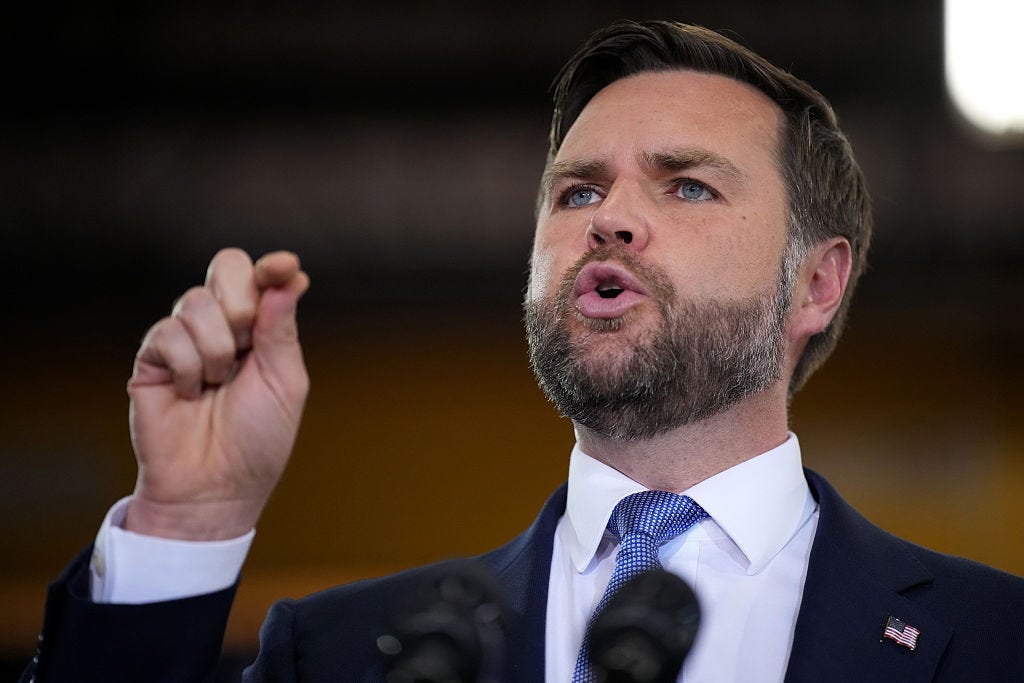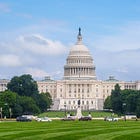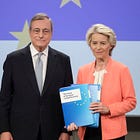The Wanton Destruction of American Power
Trump’s team promised restraint. Instead, they’re taking a sledgehammer to U.S. influence abroad.

This article is brought to you by American Purpose, the magazine and community founded by Francis Fukuyama in 2020, which is proudly part of the Persuasion family.
For years, critics of U.S. foreign policy accused Washington of “overreach” and “hubris.” For Vice President J.D. Vance, like other influential voices in the administration and the MAGA movement, the failures of Iraq and Afghanistan loomed large in his formative years—and mentions of a “liberal international order” sounded outdated and hollow. The United States, the argument went, had taken on too much responsibility, including for affairs that were tangential to our interests, and it lacked the resources to manage them all adequately. Even helping Ukraine defend itself, through a modest flow of military assistance, was somehow out of America’s reach.
Indeed, in his commencement address at the U.S. Naval Academy in May this year, the vice president offered a version of this narrative when he spoke about the “end of a decades-long approach to foreign policy” in response to changing circumstances. Unlike in the brief period earlier, when the United States was “a superpower without any peer,” as Vance put it, “the era of uncontested U.S. dominance is over. Today we face serious threats in China, Russia and other nations determined to beat us in every single domain; from spectrum to low earth orbit to supply chains to even our communication infrastructure.”
It is hard to dispute Vance’s assessment of the global situation America faces. There is indeed a growing gap between America’s global ambitions and responsibilities, and the toolbox available to meet such goals. The U.S. military, for example, would find it difficult to fight a major war in two global theaters simultaneously, as the National Defense Strategy Commission has found. Runaway deficit spending, meanwhile, risks jeopardizing any serious effort to raise defense spending. Chronic fiscal profligacy is also chipping away at the world’s confidence in the U.S. dollar as a reserve currency.
While such challenges may indeed call for a “generational shift in policy,” as Vance put it, they also make the administration’s actual policies all the more difficult to understand. Instead of “realism” and “restraint”—which would presumably scale down the level of America’s ambitions to match the resources available—the Trump administration is taking a sledgehammer to some of the most important instruments of U.S. power, from its trade policy, through USAID, to international broadcasting. Meanwhile, it has chosen to do very little to address America’s economic and fiscal weaknesses. Protectionism, record budget deficits under the One Big Beautiful Bill, and the creeping nationalization of industry risk are achieving the exact opposite.
And while the administration has been primed to resist any temptation to put “boots on the ground” overseas or engage in “nation-building,” little suggests that the level and scope of American ambitions worldwide have been lowered. After all, the new administration already waged a campaign against Houthi rebels in Yemen. It struck Iran’s nuclear installations. The president is actively involved in high-stakes diplomacy in an effort supposed to bring peace to Ukraine. Meanwhile, Washington remains committed, at least rhetorically, to great power competition with China.
Wisely or not, the Trump team has also set itself additional foreign policy-adjacent goals, such as reducing America’s persistent trade deficits and bringing manufacturing jobs back from abroad. The pursuit of such aims, oftentimes poorly defined, seems to override more traditional foreign policy concerns. A one-time “deal” in which the president makes an ally or a partner “pay” is seen by the administration as far more valuable than simply doing a good job at alliance management.
As a result, the discrepancy between America’s foreign policy aims and means has only widened. Alliances need to be nurtured and invested in, not just used for our ends. America’s global leadership after 1945 was unique not only because of the nation’s unparalleled power, but also because of the low cost at which it could rally others to its cause. What underwrote the Pax Americana was the sense that the United States was a different kind of superpower from empires of the past: neither predatory nor seeking domination for its own sake. Unlike its adversaries, the United States could count on real friends, not just on clients or subjugated nations.
The supposed “transactional” turn in U.S. foreign policy, epitomized by the one-sided “deals” that the Trump administration concluded with the United Kingdom, the EU, and Japan, might generate some short-term economic gains but it is also bound to cripple the nation’s ability to build a broader coalition to achieve its foreign policy aims.
Instead of a promised “realist” adaptation to a world in which the United States does not command quite as much unilateral power as before, Washington is squandering much of its leverage to extract perfunctory one-off concessions—think vague, unenforceable promises of future investment in the U.S. economy or purchases of U.S. goods and commodities—from its partners and allies whose help it might eventually need to deal with much more serious challenges. These putative “deals,” moreover, stand on shaky ground, as the administration’s tariff policies continue to exist on precarious legal footing.
While humoring President Trump seemed like the better option for the British, Japanese, and EU leaders for now, it has also made the United States seem both exploitative and unreliable. If in the past, European policymakers would wait for cues from Washington, now they are rushing to think about ways in which they can work together, around the U.S. administration. Whether or not the wars in Iraq and Afghanistan were good ideas, it strains credulity to think that the United States could put together similarly effective coalitions today, with allied nations placing their troops’ lives on the line in pursuit of America’s security interests.
Similar logic applies to partners farther away, both geographically and in terms of their interests. The previous administration failed to get the “Global South” on board in its effort to shut Russia off from the global economy following its full-scale invasion of Ukraine. If anything, U.S. relations with India, South Africa, and Brazil have deteriorated, driving these fence-sitting countries into the hands of America’s adversaries.
India’s case is as instructive as it is catastrophic. First, there were the tariffs imposed on the visibly bad-faith grounds that India was purchasing Russian oil—all while the administration was putting no pressure on Putin’s regime itself. Second, as some reports suggest, there was the president’s clumsy insertion of himself into the Indian-Pakistani relationship, made worse by unsubtle hints that India should back his bid for the Nobel Peace Prize. The visible warmth between Narendra Modi, Xi Jinping, and Vladimir Putin at their recent encounter at the Shanghai Cooperation Organization in Tianjin is a logical consequence of Trump’s policies.
Defeats in wars, much like debt and financial crises, come about slowly and then all at once. There is a dangerous illusion in thinking that, since the first eight months of the second Trump term has not precipitated a new major war or an economic disaster, America and the world are going to emerge from his presidency unscathed. Unless there is a quick course correction, the widening discrepancy between what the Trump administration wants to do in the world, for better or worse, and the ever-thinner list of friends and effective soft-power tools available to the president and his team, will soon lead to a fiasco.
Dalibor Rohac is a senior fellow at the American Enterprise Institute in Washington DC and a contributing editor at The American Purpose.
Follow Persuasion on X, LinkedIn, and YouTube to keep up with our latest articles, podcasts, and events, as well as updates from excellent writers across our network.
And, to receive pieces like this in your inbox and support our work, subscribe below:






"Instead of “realism” and “restraint”—which would presumably scale down the level of America’s ambitions to match the resources available—the Trump administration is taking a sledgehammer to some of the most important instruments of U.S. power, from its trade policy, through USAID, to international broadcasting. Meanwhile, it has chosen to do very little to address America’s economic and fiscal weaknesses. Protectionism, record budget deficits under the One Big Beautiful Bill, and the creeping nationalization of industry risk are achieving the exact opposite."
No.
This is crap writing.
All those things are exactly needed to inject more realism and restraint into US foreign policy. The US government under previous regimes was using all this dark money to cause social disruption in other countries to influence elections. Then under Obama, those tactics and funds were turned inwardly to cause social disruption in the US to influence elections. Stopping all this is exactly in line with the Trump agenda as campaigned.
Addressing America's economic weakness needs to first be defined if you are going to make the claim that Trump and Scott Bessent are failing to address it. And this relates to the people that elected Trump to solve real problems. The economic weakness in the US is not represented by GDP nor Wall Street valuations. The top 10% in the country have benefitted richly from globalism... they own about 90% of all the stocks. The bottom 80% own 8%. The top 10% own nearly 50% of all real estate assets. The bottom 80% own 12.8%. The Trump mandate was to fix this imbalance of income and wealth growth that had been going on from the corporate outsourcing of working and middle-class economic opportunity to places like Mexico, China and Canada. Also, the flooding of the nation with poor and uneducated people from south of the border that increased the competition for the few remaining jobs and drove down wages for more corporate profit, and also impacted housing supplies so housing costs got jacked.
Trump has been in office in his second term, the first derailed by a plandemic, for less than a year, and yet we have had decades of economic destruction of the lower 80% (that can only cheer about cheap Chineses crap goods at Walmart) from the Professional Managerial Class that runs the Democrat party and the old looting GDP establishment.
It is too bad that your upper-class day trading account is at risk. But keeping you fat wasn't every in the Trump agenda.
I wish that more politicians in the USA and others as well could see the European integration as an inspiration for doing more similar processes regarding North and South America, for the start. Also, the need for global cooperation and integration is not going to stop only because of Trump and MAGA. As humanity we still need to engage in many topics as climate and trade.